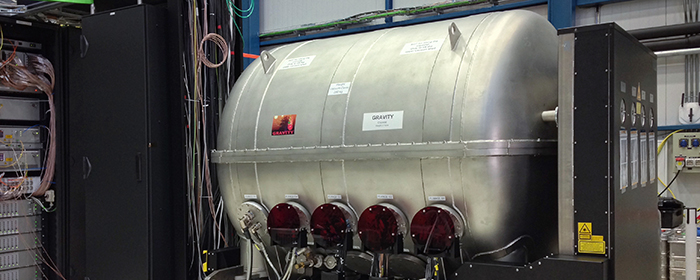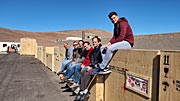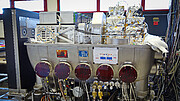Annuncio
Powerful New Black Hole Probe Arrives at Paranal
VLTI GRAVITY instrument assembled and tested
11 Agosto 2015
A new instrument called GRAVITY has been shipped to Chile and successfully assembled and tested at the Paranal Observatory.
GRAVITY is a second generation instrument for the VLT Interferometer (VLTI). It will allow the measurement of the positions of astronomical objects on the finest scales and perform interferometric imaging and spectroscopy. GRAVITY will bring the most advanced vision to the VLT, combining four individual telescopes of the Paranal Observatory so that they effectively act as a single telescope with a diameter of more than 100 metres.
Using several novel techniques, GRAVITY will offer sensitivity and accuracy far beyond what is possible today [1]. It aims to measure the positions of objects on scales of order ten microarcseconds, and perform imaging with four milliarcsecond resolution. For illustration, this corresponds to seeing buildings on the Moon, and locating them to within a few centimetres.
GRAVITY will push high angular resolution astronomy to new limits: it will probe physics close to the event horizon of the supermassive black hole at the Galactic Centre — a region which is dominated by effects predicted by Einstein's theory of general relativity. In addition, it will uncover the details of mass accretion and jets — processes that occur both in young stellar objects and in the active nuclei of other galaxies. It will also excel at probing the motions of binary stars, exoplanets and young stellar discs, and in imaging the surfaces of stars.
On 21 July 2015 the team saw “first laboratory fringes” from GRAVITY in the Paranal integration hall using a test light source. Following further tests of the GRAVITY instrument and the preparation of the VLT interferometer, GRAVITY will be moved to the VLTI later this year to see “first star fringes” using the four 1.8-metre Auxiliary Telescopes starting in November 2015. The commissioning of GRAVITY with the four 8-metre VLT Unit Telescopes is foreseen for the first half of 2016.
GRAVITY's development was led by the Max Planck Institute for Extraterrestrial Physics, in Garching, Germany and involves six institutes across Europe [2], as well as ESO.
Notes
[1] GRAVITY features fibre-fed integrated optics beam combiners, infrared wavefront sensors for adaptive optics, fringe tracking, active beam stabilisation, and a novel metrology concept.
[2] The partner institutes in the GRAVITY Consortium are:
- Max Planck Institute for Extraterrestrial Physics, Garching, Germany
- LESIA, Observatoire de Paris, Université Paris Diderot, Meudon, France
- Max Planck Institute for Astronomy, Heidelberg, Germany
- University of Cologne, Cologne, Germany
- Institut de Planétologie et d’Astrophysique de Grenoble (IPAG), Grenoble, France
- Laboratório de Sistemas, Instrumentação e Modelação em Ciências e Tecnologias do Ambiente e do Espaço (SIM), Lisbon and Porto, Portugal
- ESO, Garching, Germany
Links
Contatti
Markus Schoeller
ESO, Garching, Germany
Email: mschoell@eso.org
Frank Eisenhauer
Max Planck Institute for Extraterrestrial Physics, Garching, Germany
Email: eisenhau@mpe.mpg.de
Richard Hook
ESO Public Information Officer
Garching, Germany
Tel: +49 89 3200 6655
Cell: +49 151 1537 3591
Email: rhook@eso.org
A proposito dell'annuncio
| Identificazione: | ann15061 |
Our use of Cookies
We use cookies that are essential for accessing our websites and using our services. We also use cookies to analyse, measure and improve our websites’ performance, to enable content sharing via social media and to display media content hosted on third-party platforms.
ESO Cookies Policy
The European Organisation for Astronomical Research in the Southern Hemisphere (ESO) is the pre-eminent intergovernmental science and technology organisation in astronomy. It carries out an ambitious programme focused on the design, construction and operation of powerful ground-based observing facilities for astronomy.
This Cookies Policy is intended to provide clarity by outlining the cookies used on the ESO public websites, their functions, the options you have for controlling them, and the ways you can contact us for additional details.
What are cookies?
Cookies are small pieces of data stored on your device by websites you visit. They serve various purposes, such as remembering login credentials and preferences and enhance your browsing experience.
Categories of cookies we use
Essential cookies (always active): These cookies are strictly necessary for the proper functioning of our website. Without these cookies, the website cannot operate correctly, and certain services, such as logging in or accessing secure areas, may not be available; because they are essential for the website’s operation, they cannot be disabled.
Functional Cookies: These cookies enhance your browsing experience by enabling additional features and personalization, such as remembering your preferences and settings. While not strictly necessary for the website to function, they improve usability and convenience; these cookies are only placed if you provide your consent.
Analytics cookies: These cookies collect information about how visitors interact with our website, such as which pages are visited most often and how users navigate the site. This data helps us improve website performance, optimize content, and enhance the user experience; these cookies are only placed if you provide your consent. We use the following analytics cookies.
Matomo Cookies:
This website uses Matomo (formerly Piwik), an open source software which enables the statistical analysis of website visits. Matomo uses cookies (text files) which are saved on your computer and which allow us to analyze how you use our website. The website user information generated by the cookies will only be saved on the servers of our IT Department. We use this information to analyze www.eso.org visits and to prepare reports on website activities. These data will not be disclosed to third parties.
On behalf of ESO, Matomo will use this information for the purpose of evaluating your use of the website, compiling reports on website activity and providing other services relating to website activity and internet usage.
Matomo cookies settings:
Additional Third-party cookies on ESO websites: some of our pages display content from external providers, e.g. YouTube.
Such third-party services are outside of ESO control and may, at any time, change their terms of service, use of cookies, etc.
YouTube: Some videos on the ESO website are embedded from ESO’s official YouTube channel. We have enabled YouTube’s privacy-enhanced mode, meaning that no cookies are set unless the user actively clicks on the video to play it. Additionally, in this mode, YouTube does not store any personally identifiable cookie data for embedded video playbacks. For more details, please refer to YouTube’s embedding videos information page.
Cookies can also be classified based on the following elements.
Regarding the domain, there are:
- First-party cookies, set by the website you are currently visiting. They are stored by the same domain that you are browsing and are used to enhance your experience on that site;
- Third-party cookies, set by a domain other than the one you are currently visiting.
As for their duration, cookies can be:
- Browser-session cookies, which are deleted when the user closes the browser;
- Stored cookies, which stay on the user's device for a predetermined period of time.
How to manage cookies
Cookie settings: You can modify your cookie choices for the ESO webpages at any time by clicking on the link Cookie settings at the bottom of any page.
In your browser: If you wish to delete cookies or instruct your browser to delete or block cookies by default, please visit the help pages of your browser:
Please be aware that if you delete or decline cookies, certain functionalities of our website may be not be available and your browsing experience may be affected.
You can set most browsers to prevent any cookies being placed on your device, but you may then have to manually adjust some preferences every time you visit a site/page. And some services and functionalities may not work properly at all (e.g. profile logging-in, shop check out).
Updates to the ESO Cookies Policy
The ESO Cookies Policy may be subject to future updates, which will be made available on this page.
Additional information
For any queries related to cookies, please contact: pdprATesoDOTorg.
As ESO public webpages are managed by our Department of Communication, your questions will be dealt with the support of the said Department.




